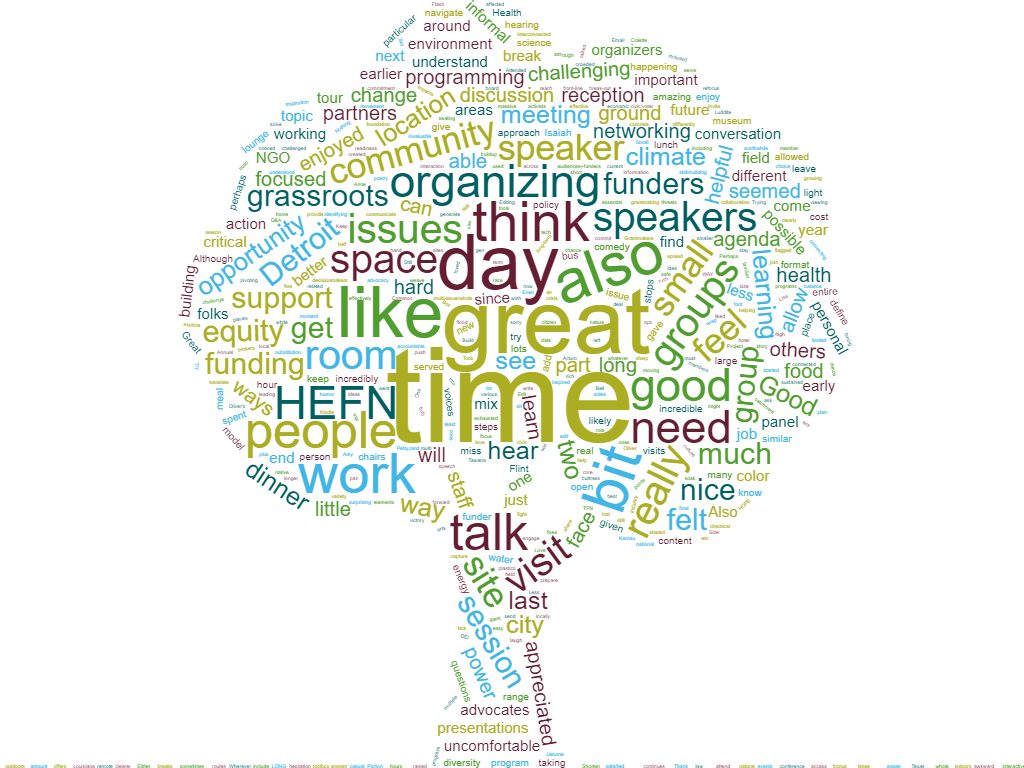This blog, authored by HEFN program associate, Cindy Glass, draws from survey results of the 2017 HEFN Annual Meeting held in Detroit, Michigan, in November this year.
We asked funders who attended HEFN’s 2017 Annual Meeting on “Rewriting the Rules” to share their top takeaways in a post-meeting survey. The myriad thoughtful responses ranged from the pointed – “Flint still has a water crisis” — to the poignant – “It is incredibly frightening the trajectory of increased health and environmental threats that will be growing under the current political and economic paradigm and the people in the room give me HOPE” – to the poetic – “Funders need to learn how to dance.”
Here is a selection of other funder takeaways from the annual meeting:
Grassroots Momentum
Small grassroots groups, even with little funding, are doing powerful organizing and citizen science, generating people power and data to buttress their advocacy work. More and sustained core funding for grassroots community organizing is essential to make progress on the most intractable health and environmental issues we face.
One survey comment: “viewing what organizers are doing on the ground is helpful to see what other groups are doing and how we can add to each other’s campaigns if possible.”
Long Haul
Serious environmental health problems – like Gulf Coast communities hit by hurricanes and Flint families’ lead exposures – create long-term impacts. Philanthropy can help with response, recovery, and resilience with long-term support and capacity-building.
Participants were inspired by meeting speakers including New Orleans-based Colette Pichon Battle and Isaiah Oliver, President of the Community Foundation of Greater Flint. “Hearing from Colette Pichon Battle was a great way to end the one-day ‘Climate, Health & Equity’ meeting –her story is so impressive and she is a wonderful speaker,” and “Isaiah Oliver gave a very powerful and moving speech!”
Communications Capacity
Virtually all partners want support to improve their effective communications with various audiences, be they NGOs, funders, community members, or decision-makers.
Equity Focus
The meeting program integrating equity throughout sessions sparked several comments about the importance of deepening understanding, including a “need for philanthropy to define its terms, esp. charged ones like ‘equity,’ ‘diversity, and ‘justice’ — and to understand how NGO partners define those terms for their own communities and work.”
More Conversation
Funders attending the meeting liked sessions and side events offering the chance for peer conversation – and want more of that time in future events.
One comment from an attendee at the advancing equity dinner: “I enjoyed being able to talk openly with other grantmakers about the challenging work in a format that allowed everyone to be vulnerable while learning. It seemed like a great space and the set-up of the dinner was also great. Although it was a challenging subject, it was great to feel all the things and really feel like I had developed deeper relationships over a meal.”
More Listening
It’s important to hear directly from those most affected by environmental health problems about their realities and their ideas for solutions. And for philanthropy to hear more from people of color on a range of issues, including on how to address racism and advance equity.
One comment from a site visit participant: “Great to be out there and hearing from those working on the ground.”
Civic Engagement
Issue-focused philanthropy could do much more to build the power of people through long-term investments integrating civic and voter engagement with organizing and issue work.
Participants added comments about their experience, like: “Overall, for the entire meeting, HEFN did a great job of overlapping many interconnected issues – climate, water, food, etc.” “The diversity of voices and the critical nature of topics was great … It seemed to capture the moment and truly push the community forward.”
Along with these takeaways, we asked funders at the meeting for their ideas for what HEFN could do for environmental health and justice in these disruptive times. Some of their ideas:
- A convening on communications
- Regular issue-focused funder calls
- More analysis and strategy conversation about opportunities crossing issues
- Work to expand field of environmental health philanthropy in diverse, equitable ways
- More funder involvement in grants tracking
We’ll be taking the feedback and calls to action to heart as we approach the end of 2017. Save the date for next year’s meeting – Nov. 28-30, 2018 – to see how these ideas have moved forward.

